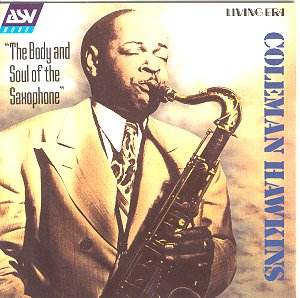"The Body and soul of the Saxophone"
COLEMAN HAWKINS
 ASV Living Era Mono
CD AJA
5378
ASV Living Era Mono
CD AJA
5378
Crotchet

Body and Soul
Hello Lola
One hour (If I could be with you one hour tonight)
The house of David blues
Queer Notions
It's the talk of the Town
The Day You Came Along
Jamaica Shout
I've Got to Sing a Torch Song
Donegal cradle Song
It Sends Me
Dinah
When Day is Done
Dedication
Esquire Bounce
My Ideal
Voodte
How Deep is the Ocean
The Man I Love
I Only have Eyes for You
Stuffy
Say it isn't so
Picasso
To say that Coleman Hawkins was the founding father of the Tenor saxophone
in jazz, would not be an overstatement. He was not the first to record on
the instrument but he was the first to make it sound like it belonged there.
As jazz progressed out of the tight confines of the New Orleans trumpet,
Trombone, Clarinet front line, it became even more appropriate. It is said
that Coleman always liked to know the words of every tune he played, because
he built his improvisations around them, it always sounds that way to me.
He was the great master of the long and always melodic phrase and although
he developed a phenomenal technique, it was never used just to show off,
but was always present to support his jazz ideas.
The record starts in 1939 with the all time classic and definitive version
of Body and Soul It should be studied by every aspiring Tenor Sax player,
as it is a masterpiece of improvisation and the tune Hawkins will always
be associated with. We then go back in time to 1929 for a couple of tracks
from the Mound City Blue Blowers, this band of aspiring youngsters also included
Glenn Miller on trombone and Gene Krupa on drums. The next three tracks have
him in the setting of the Fletcher Henderson Orchestra, to which he gave
a real edge over the rival bands of the time.
A Spike Hughes 1933 session produced Donegal Cradle Song on which Hawkins
manages to produce a solo, which has a blues feel with an overtone of an
Irish Folk Song, no mean feat! 'It sends me', is a very well played duet
with pianist Buck Washington. Dinah, is with the Lionel Hampton band, which
includes Benny Carter on Trumpet.
Esquire Bounce and My Ideal come from a 1943 Leonard feather session and
feature Art Tatum on piano, Ed hall on clarinet, Cootie Williams on trumpet
and the redoubtable Oscar Pettiford on bass.
The remaining tracks feature Coleman with several different small groups,
which all produce some very pleasant improvisation mostly on standard tunes.
The final track was new to me, a 1938 recording of an unaccompanied solo
by Hawkins called Picasso, I found it very much to my liking and again
demonstrated the virtuosity of this giant of the saxophone.
Rumour has it that Coleman Hawkins died because he could not bear to get
old. If you listen to how his work develops here and then go on to listen
to the volume of work that followed these recordings, you realise that whilst
like all of us, his body got older Coleman Hawkins was a man who was in tune
with the times.
This is a valuable release and I give it 4 Stars.
Don Mather
